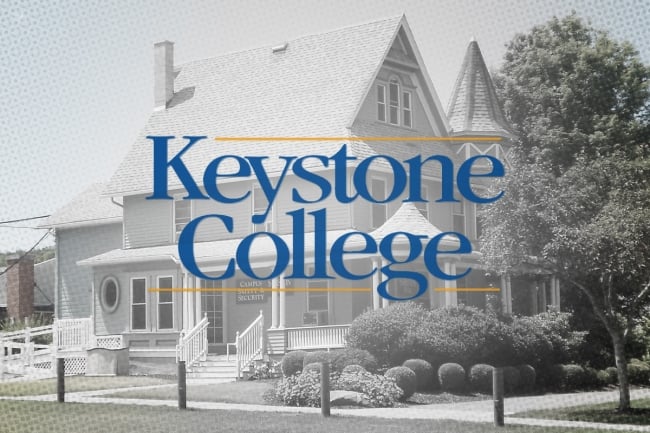You have /5 articles left.
Sign up for a free account or log in.

Keystone College has existed for over 150 years, but that run may not last much longer.
Photo illustration by Justin Morrison/Inside Higher Ed | Smallbones/Wikimedia Commons | Keystone College
After more than 150 years of existence, Pennsylvania’s Keystone College may close soon. It hasn’t been very transparent about this fact.
Around 1,100 students attend the private, nonprofit college north of Scranton, and it’s currently enrolling students for the fall semester. But current and prospective students, and current employees, have no assurance that the college will continue.
Keystone was a community college until awarding its first bachelor’s degree in 2000. In 2014, it announced it received approval to offer master’s degrees, and that it was adding football in 2019. The college has struggled financially for at least the past decade, seeking new partnerships for aid, along with help from one of its home counties, to try and stay afloat. Now time may be running out.
Two weeks ago, Keystone’s accreditor, the Middle States Commission on Higher Education (MSCHE), posted on its website that the beleaguered college was “in danger of imminent closure.” In fact, the college had itself submitted a notice of planned closure, including specifics of how the institution was planning for it, the accreditor noted.
The day after MSCHE’s post, Keystone’s president, John F. Pullo Sr., sent letters to the faculty, staff and students about the situation, and the college posted a statement on its website. “[Y]ou should remain hopeful about your ability to continue your education at Keystone in the days ahead,” he wrote to students. And the college’s April 26 post said the college “is continuing to pursue discussions with an investment partner to secure an agreement which would be in the best interest of Keystone, its students and the entire college community.”
But this wasn’t the first time Keystone had put its hope in an external savior. Worried students, parents and others may have recently read in the local press that Keystone had withdrawn a previous plan to transfer ownership of the institution to a new nonprofit, and that MSCHE had subsequently asked Keystone for a plan to “teach out” students in case the college closed. Such plans can allow for students to finish their degrees elsewhere.
The college’s April 26 statement said it was MSCHE that asked it to submit the notice of planned closure. The college said it could withdraw the notice if it’s not needed and labeled it “a procedural step required to enact a teach-out plan.”
But on Wednesday, the accreditor, which decides whether or not Keystone students can continue receiving federal student aid, took the unusual step of emailing reporters “to correct misleading information.” The email, now posted on their website as a statement, said “it has been reported that the institution’s substantive change request for institutional closure is ‘a procedural step.’” It was more serious than that, MSCHE said: “[T]he institution has reported potential imminent closure to the commission, and for that reason, the institution has been asked to submit the substantive change for institutional closure.”
When asked what “misleading information” the email was referencing, Nicole Biever, a spokesperson for the accreditor, pointed Inside Higher Ed to the April 26 statement on Keystone’s website. Biever said that Keystone officials “told us that they had the potential for imminent closure in March. They didn’t submit the substantive change at that time, but they told us.” She said that was after the college withdrew its previous plan to transfer ownership to the new nonprofit.
She further pointed to a Higher Ed Dive article from Friday that said Keystone and the “new investment partner … have reached a ‘general agreement’ with MSCHE.” Pullo had said in his April 26 letter to employees that “there is general agreement on the approach by all parties involved, including our accreditor, MSCHE.”
But the accreditor said it’s unaware of any agreement regarding the college. MSCHE’s Wednesday statement says “the commission is not currently reviewing any agreements with potential investment partners … and has not approved any agreements with investors or partners.”
The statement further seemed to throw cold water on Keystone’s latest attempt to save itself. “While the commission is aware of continued negotiations by Keystone College with a potential partner, the imminent closure remains a concern as any transactions under the commission’s complex substantive change policy, procedures and guidelines can take up to a year to review,” the accreditor wrote. And the accreditor has given Keystone only until Aug. 1 to “show cause” why its accreditation shouldn’t be withdrawn.
That “show cause” report must include, among several other things, “documented financial resources … adequate to support its educational purposes and programs and to ensure financial stability.” That’s not something Keystone has previously been good at.
A Decade of Heightened Scrutiny
About a decade ago, the U.S. Department of Education placed the college on “heightened cash monitoring,” The (Scranton) Times-Tribune reported. The department says it may take this step for “a number of financial or federal compliance issues, some of which may be serious and others that may be less troublesome.” Keystone remains on heightened cash monitoring today, according to the department.
The Times-Tribune also reported that Wyoming County, one of two counties the college straddles, previously guaranteed $8 million in new debt that Keystone took on, and the college began giving county residents 10 percent off their tuition in return. Rick Wilbur, chairman of the county commission, didn’t provide Inside Higher Ed an interview, instead referring a reporter to the college spokesperson.
MSCHE first posted on its website April 4 that it was requesting the teach-out plan. The following day, as questions about Keystone’s future swirled, a U.S. Education Department official responded to Inside Higher Ed’s request for information about its status.
The department, according to the official, had cited Keystone in fall 2023 for submitting audited financial statements late for two fiscal years. As of April 5, Keystone still had not submitted its statements for the fiscal year ending in June 2022, and it had newly become tardy on submitting the statements for the fiscal year ending in June 2023.
Keystone didn’t provide Inside Higher Ed interviews for this article. Pullo didn’t return a call. Timothy J. Pryle, Keystone’s vice president of enrollment, institutional advancement and marketing, provided some information via email. He didn’t contest MSCHE’s correcting-the-record email, saying “Keystone is in full agreement with all of the facts that are included.” The college is still talking with the investment partner, he said, but “we are not yet at a point to share any information on the potential investment partner.”
Pryle asked Inside Higher Ed to stop asking the college’s previous potential partner about what happened to that deal.
A WIER(D) Attempt, and an Unspecified Investigation
The accreditor’s request for a teach-out plan followed a failed effort to transfer ownership of the college to an entity formed by a recent member of Keystone’s Board of Trustees.
Sometime early last year, Ahmed Alwani, founder and president of the Washington, D.C.-based New Lines Institute for Strategy and Policy think tank, founded a nonprofit called the Washington Institute for Education and Research (WIER), according to those two institutes’ websites. In February 2023, WIER and Keystone “entered into a Membership Interest Transfer Agreement,” according to a notification letter Pullo sent to the Pennsylvania Department of Education.
Few details have been made public about the plan. Pullo wrote that the transaction would make WIER the college’s “sole member.” A document that the state education department provided Inside Higher Ed said WIER would be the college’s “one voting member.” Yet Pullo wrote that “Keystone will remain a domestic nonprofit corporation and the Board of Trustees will remain responsible for the academic and administrative affairs of the college.” He didn’t mention who would control the finances.
Alwani, who declined comment to Inside Higher Ed through a spokesman, appears to have joined the board sometime after the transfer agreement was struck. Pryle told Inside Higher Ed that “Dr. Alwani was a member of the college’s Board of Trustees but stepped down voluntarily soon after the initial agreement was dissolved by both parties in early March.”
Pullo, in his letter to the Pennsylvania Department of Education, noted that the transaction required approval from MSCHE. The commission did receive a request for what’s called a “Change in Legal Status, Form of Control or Ownership” regarding the college and WIER, the accreditor said.
But the college withdrew that request March 8—while the accreditor was reviewing it, and less than a week before the accreditor was set to vote on it. It’s unclear why WIER and the college stopped working toward an agreement. MSCHE keeps communications between institutions and itself confidential.
Due to the college withdrawing the change of ownership request, MSCHE asked for more information. Pullo wrote in his letter to employees that the failure of the WIER partnership “not only immediately weakened the college’s financial position, but also triggered heightened scrutiny from our accreditor.” MSCHE requested, among other things, “a comprehensive, implementable teach-out plan and agreements”—suggesting at least some degree programs could end. The plan was due by April 12. Keystone didn’t provide it to Inside Higher Ed.
Five days after the college withdrew its request, local media reported that the change of ownership deal had fallen apart and the college had placed Stuart Renda, its vice president for finance and administration, on administrative leave. The college also said there was an independent investigation, but The (Scranton) Times-Tribune reported that it didn’t “specify who or which agency is doing an investigation and who or what is under investigation.”
A spokesperson for the Pennsylvania attorney general’s office said in an email to Inside Higher Ed that “we have accepted a referral from the Wyoming County District Attorney’s Office” of the district attorney’s own review. But it’s unclear what that review was about. The spokesman wrote that “you would have to check with the DA [district attorney] on their specific work.”
Questioned by Inside Higher Ed, Joe Peters, the Wyoming County district attorney, wrote in an email that “our office did not launch an inquiry, nor conduct an investigation. We did receive information from Keystone College, but it was immediately obvious that there would inherently be a conflict for this office to embark upon an inquiry, much less an investigation.” So his office asked the attorney general’s office to review the situation.
Keystone’s enrollment of 1,100 students in fall 2022, the latest enrollment data on the National Center for Education Statistics website, was down from 1,400 a decade before. Sean Wright, Keystone’s director of admissions, told Inside Higher Ed that enrollment has remained around 1,100 for years. In August 2023, in another possible attempt to stay afloat, it announced its creation of a Department of Graduate and Adult Education to “place even greater emphasis on attracting, enrolling and retaining graduate and adult students.”
While the accreditor has said Keystone must show it continues to deserve accreditation by Aug. 1, the college appears to be planning for a fall semester. Wright said admissions are proceeding, and “as of right now, our numbers of admits [admitted students] are higher than they’ve ever been.” He said “all of our prospects are being brought up to speed” about the college’s situation.
Wright acknowledged that the media attention around the college’s plight has created obstacles in landing new students. “Between the FAFSA debacle and this, it’s making it an increasing challenge to do,” he said, “but we’re still working on it.”




